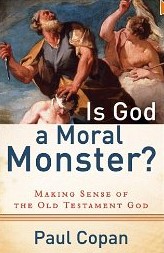 This is the last in a 3-part series of reviews of Paul Copan’s recent book Is God a Moral Monster? Making Sense of the Old Testament God (2011, Baker). Previously I discussed differences between Copan’s book and mine (GBB) and things I appreciated or found helpful about his book. Here, I’ll mention some issues, questions and concerns I had about it.
This is the last in a 3-part series of reviews of Paul Copan’s recent book Is God a Moral Monster? Making Sense of the Old Testament God (2011, Baker). Previously I discussed differences between Copan’s book and mine (GBB) and things I appreciated or found helpful about his book. Here, I’ll mention some issues, questions and concerns I had about it.
Will skeptics be convinced by his arguments? People have expressed the same concern about my book. But I think even my title takes the problem more seriously by stating the problem baldly that God at least appears to behave badly, then I move to a question (“Is the God of the OT…?). Copan, however begins with the question (“Is God…?) then moves to claim that he’s going to make sense of the OT God. This subtle difference in our titles is indictive of our different approaches.
In order for atheists, agnostics or skeptics to feel taken seriously in these types of discussions, their perspective will need to be more fully validated. Copan is not unique in this regard. As Christians we do a lousy job of listening to people outside the church and taking their perspectives seriously (generally, I think Copan is working hard to do this).
By stating that God behaves “badly” in my title, I’ve offended some Christians. But that’s OK with me, if I can encourage the skeptics to read about a God who doesn’t always behave “badly” and most often behaves graciously, lovingly and mercifully.
For a philosophy and ethics professor, he does a great job with biblical scholarship (better than I would do with his fields), but there are a few times where it’s clear he’s not a Hebrew Bible guy. (In his discussion of Abraham’s call he mistakes a pronominal suffix on a preposition as a verbal form twice; p. 45.)
I mentioned this in my first review of Copan, but he doesn’t offer many possible applications or spiritual take-aways from these topics (which makes sense given his genre), but personally the biggest problem with these topics isn’t that God behaves badly, but that Christians (myself included) and God’s church often behave badly–we are angry, sexist, racist, violent, rigid, legalistic. So, as we defend God from accusations about these things, we need to reflect on how we need to repent of these sins.
While I’m sure I’ll use Copan’s book as a reference resource anyway, I was disappointed to not find a Scripture index. Perhaps for the next edition?
What other concerns, issues or questions do you have about Copan’s book? Do you think skeptics would be convinced by his arguments?
